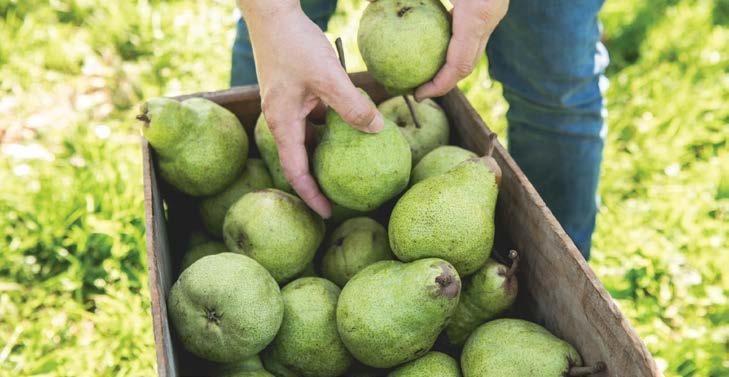
5 minute read
Pride in keeping family orchard running
FEATURE
ARTICLE
Freshly harvested Packham pears
For 60 years Boric Orchards has been supplying Kumeu and the wider Auckland area with a range of produce. HELENA O’NEILL speaks to third-generation orchardist, Michael Boric, about the family business.
COVER STORY
Boric Orchards has always constituted a large part of Michael Boric’s life.
“Growing up I’ve always worked there. I went to university and did a property degree, but in 2008 there was a recession so there wasn’t much happening in the property market and I ended up back on the orchard,” Michael says. In 1942, Frank and Zorka Boric purchased an 11-hectare Henderson orchard, shifting to their 32-ha Kumeu property in 1962. With the help of their sons Milenko and Barry, they planted it with fruit trees that enabled the business to export its produce until the late 1990s. Those trees are still producing today. The sons’ wives, Sonja and Maria, later joined in on the operation, managing a produce shop under the trading name of Boric Orchards up until 2012. Then third-generation growers and brothers, Franco and Stefan Boric (Michael’s cousins), went on to create Boric Food Market by expanding the sheds to house a speciality food market and deli.
Michael Boric junior, the son of Milenko and Sonja, now manages the orchard. Today, half the property remains an orchard while the other half is leased to a market garden operation. Most of the trees are apples, with a mix of old and new varieties across about five hectares.
“We’ve got about 15 varieties of apple; the biggest variety would be Royal Gala. We still have Braeburn, Granny Smith, and some older ones like Splendour and Ballarat cooking apples. There’s still a demand for cooking apples
and we tend to fill a hole up here because a lot of apples come from Hawke’s Bay, Nelson, and Otago.” The remainder of the orchard is planted with about 2ha of pears, 1.5ha plums, 0.5ha peaches, 1.5ha navel oranges, with 0.5ha in lemons, mandarins, and grapefruit. There are also a few fig and quince trees. “There’s a bit of a niche market for fig and quince. We have some older trees that have been there for a while.”
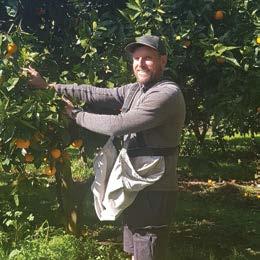
Some of the Granny Smith blocks are more than 40 years old and still produce fruit. “We’ve planted some younger blocks in the past couple of years. We haven’t got to full intensive planting yet, but I might try some trees on fences and wires like they do further south. It’s quite a bit of cost upfront and we don’t need to irrigate as much here. While the past few years there have been droughts, we tend to get rain at the right time, a good downpour a couple of times a month which is enough for our established trees.”
Fruit is left to ripen on the tree before being picked straight into crates and sold. Some crops like mandarins, oranges and grapefruit solely supply Boric Food Market, while the bulk of stonefruit is sold through markets like Turners & Growers and MG Marketing. For pipfruit, if the price is good Michael will send more to the markets, otherwise he would look at trying to sell more through Boric Food Market, and can keep them in the orchard coolstore until mid-spring, if need be, he says. “Once you get one crop off the tree then it’s time for the next crop. There’s not too much picking pressure.” Michael works full-time in the orchard alongside between one to three full-time staff, supplemented by more pickers when the heavier crops are harvested.
“Pipfruit prices have been pretty static over the past ten to 20 years. Good for the consumers I guess, but growers probably struggle a bit more. It depends on the variety. With cooking apples, you can get probably $2 to $3 a kilogram during the season which is pretty good.” Some of the older apple varieties are firm favourites at Boric Food Market, particularly with older customers who prefer a softer apple like a traditional Gala instead of a Royal Gala or Envy apple. Dry summers over the past few years have been better for the stonefruit crops, with fewer brown rot infections in the orchard.
“It’s been pretty much no brown rot, which is pretty rare not to have that. Once it gets in then it’s hard to control. We’re starting to get a bit of guava moth here now. I’ve noticed it in the lemons and one or two of the peaches.”
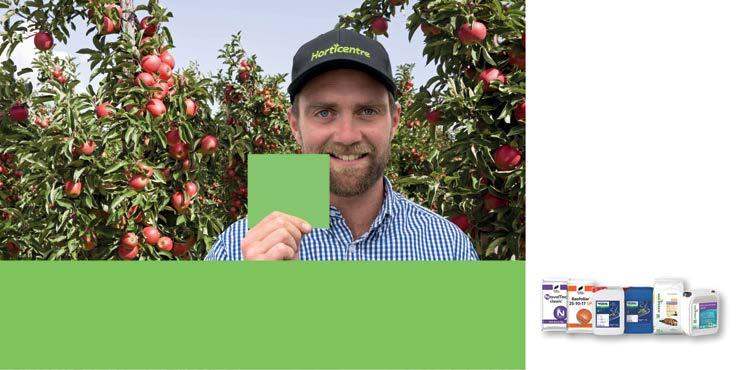
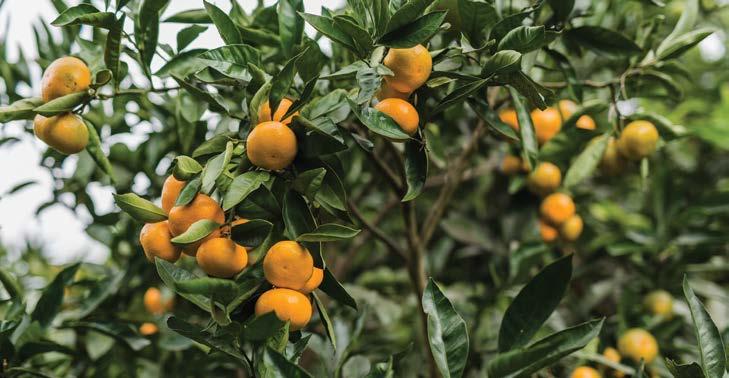
Mandarins ripening on the tree at Boric Orchards at Kumeu near Auckland
Along with the emergence of the guava moth in the wider Auckland and Northland regions, Covid-19 also provided the orchard with some additional challenges. “Initially, the government said all fruit and vegetable stores had to close, which affected the orchard because the markets weren’t taking any fruit. We were lucky because we could store a bit more in the coolstore and then send it in when they were open again.”
Having the family-owned food market nearby helped the orchard get through the first lockdown in 2020 as it provided a ready outlet for the orchard’s produce. “Boric Food Market was lucky because it was able to stay open the whole time because it’s quite a big store now and they met enough of the criteria to stay open. They sold a lot more of our produce there during the lockdown. “We had some smaller apples that we sell in bags. Normally a bin of those would sell one bin every couple of weeks, or one or two a month. They were selling one every week or two weeks, so it was pretty hectic. It was a
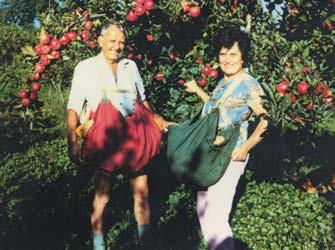
Michael’s grandparents Frank and Zorka Boric pick Splendour apples at their own orchard
shame that many other fruit and vegetable shops weren’t allowed to stay open.” Michael takes pride in the orchard and hopes to keep the family plantation running as long as the economics stack up. “It’s a nice thing to keep going. We’ve still got the land here to use… we’re not huge scale but we’ve got those niche varieties that we can still find a market for. While the orchard is still going okay then it’s worth pursuing. We’re replanting some blocks now and those trees won’t fruit for four or five years.”










